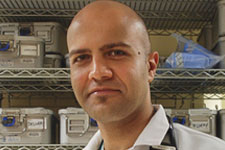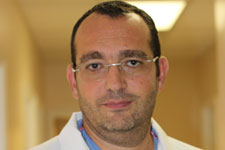Endometriosis
Endometriosis is a disease that affects women, usually between the age of 25 and 40. Endometriosis is one of the main causes of infertility among woman. It never appears before puberty and always ends at the time of menopause, due to a lack of ovarian hormones. The incidence of endometriosis is higher in infertile woman, between 25-40 %, while in general population endometriosis has an incidence of 3 – 10 %.
Endometriosis is characterized by the growth of uterine tissue outside of the endometrium. This uterine tissue grows inside of the myometrium or even outside of the uterus. When the uterine tissue grows inside of the myometrium it is called Adenomyosis or Internal Endometriosis. When the uterine tissue grows outside of the uterus it is called External Endometriosis. The uterine tissue can be found almost in every part and organ of the body, but it is more common in the ovaries, peritoneum, rectum, intestine, vagina, vulva, bladder, liver, etc.
Until today the real cause of endometriosis is not known. However, there are several theories that try to explain it. The most acceptable theories include:
• Metaplasic theory
• Implantation theory
• Metastatic theory
• Surgical scar implantation
• Immune system disorder.
Risk Factors of Endometriosis
• Never giving birth
• Uterine abnormalities
• A history of pelvic infections
• A family history of endometriosis
(mother, sister, aunt, etc)
Signs and Symptoms of Endometriosis
• Pelvic pain - severe pain during menstruation, pain in the lower part of the abdomen
• Dyspareunia - pain during sexual intercourse
• Menorrhagia - occasional heavy periods
• Menometrorrhagia - bleeding between periods
However, signs and symptoms depend from the affected part of the body. If, for example the endometrial tissue grows in the nose, the affected woman will have nose bleeding every time she has the menstrual cycle. If the endometrial tissue develops in the bladder, supra pubic pain, blood in the urine and an urge to urinate will be present.
If the endometrial tissue develops in the intestines, diarrhea, constipation, blood in the stool and even painful bowl movements will be present.
Four Stages of Endometriosis
• Stage I - minimal, lesions are only superficial and few filmy adhesions are possible
• Stage II - mild, deep lesions are present in cavum Douglasi, the extension of the peritoneal cavity between posterior wall of the uterus and rectum
• Stage III - moderate, presence of endometrioma’s on the ovary and more adhesions
• Stage IV - severe, large endometrioma’s, extensive adhesions
Infertility is the biggest problem of endometriosis. It is well known that endometriosis is one of the main causes of infertility among woman in their reproductive age. Endometriosis affects the fertility by destroying the anatomy of the ovaries and pelvis, affecting the quality of the eggs and the implantation process, by changing the hormonal system, creating multiple adhesions, etc.
How is endometriosis diagnosed?
• Pelvic examination
• Ultrasound
• Laparoscopy
• Magnetic resonance imaging (MRI)
• Tumor markers CA - 125
Endometriosis is a disease that can’t be cured. However, medical or surgical treatment can help ease the symptoms and even help the woman get pregnant. First a conservative treatment is recommended. If medical treatment results without success then surgical treatment is necessary.
Medical Treatment of Endometriosis:
• NSAID - for the pain
• Hormonal therapy
- like hormonal contraceptives and Gonadotropin-releasing hormone (Gn-RH) agonists and antagonists, Danazol.
Surgical Treatment of Endometriosis:
• Conservative surgery
• Radical surgery - hysterectomy and the removal of both ovaries
Assisted reproductive technologies are used in cases when there are difficulties conceiving.
• Our office has a 24/7 answering service to address any emergencies.













